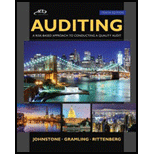
Auditing: A Risk Based-Approach to Conducting a Quality Audit
10th Edition
ISBN: 9781305080577
Author: Karla M Johnstone, Audrey A. Gramling, Larry E. Rittenberg
Publisher: South-Western College Pub
expand_more
expand_more
format_list_bulleted
Question
Chapter 4, Problem 48RSCQ
To determine
Concept introduction: An audit is an independent examination conducted to ensure that the financial statements are true and fair. Auditing standards are certain defined rules and regulation that provide guidance to the auditors for conducting the audit efficiently and effectively. The auditing standards are followed to fulfill the objective of audit.
Professional skepticism is one of the qualities of an auditor. An auditor needs to be inquisitive and alert to the situations indicating possible misstatement or fraud.
To indicate:The importance of professional skepticism and type of actions taken by a professionally skeptical auditor.
Expert Solution & Answer
Want to see the full answer?
Check out a sample textbook solution
Students have asked these similar questions
For what does an auditor use professional skepticism?
Why is professional skepticism important when completing an audit? Please explain.
Explain professional skepticism and why it is important for all auditors.
Chapter 4 Solutions
Auditing: A Risk Based-Approach to Conducting a Quality Audit
Ch. 4 - Prob. 1TFQCh. 4 - Prob. 2TFQCh. 4 - Prob. 3TFQCh. 4 - Prob. 4TFQCh. 4 - Prob. 5TFQCh. 4 - Prob. 6TFQCh. 4 - Prob. 7TFQCh. 4 - Prob. 8TFQCh. 4 - Utilitarian theory holds that what is ethical is...Ch. 4 - Prob. 10TFQ
Ch. 4 - Prob. 11TFQCh. 4 - Prob. 12TFQCh. 4 - Prob. 13MCQCh. 4 - Prob. 14MCQCh. 4 - Prob. 15MCQCh. 4 - Prob. 16MCQCh. 4 - Prob. 17MCQCh. 4 - Prob. 18MCQCh. 4 - Prob. 19MCQCh. 4 - Prob. 20MCQCh. 4 - Prob. 21MCQCh. 4 - Prob. 22MCQCh. 4 - Prob. 23MCQCh. 4 - Prob. 24MCQCh. 4 - Prob. 25RSCQCh. 4 - Prob. 26RSCQCh. 4 - Prob. 27RSCQCh. 4 - Prob. 28RSCQCh. 4 - Prob. 29RSCQCh. 4 - Prob. 30RSCQCh. 4 - Refer to the Focus on Fraud feature “Moss Adams...Ch. 4 - Prob. 32RSCQCh. 4 - Prob. 33RSCQCh. 4 - Prob. 34RSCQCh. 4 - Prob. 35RSCQCh. 4 - Prob. 36RSCQCh. 4 - Prob. 37RSCQCh. 4 - Prob. 38RSCQCh. 4 - Prob. 39RSCQCh. 4 - Prob. 40RSCQCh. 4 - Prob. 41RSCQCh. 4 - Prob. 42RSCQCh. 4 - Prob. 43RSCQCh. 4 - Prob. 44RSCQCh. 4 - Prob. 45RSCQCh. 4 - Prob. 46RSCQCh. 4 - Prob. 47RSCQCh. 4 - Prob. 48RSCQCh. 4 - Prob. 49RSCQCh. 4 - Prob. 50RSCQCh. 4 - Prob. 51RSCQCh. 4 - Refer to Exhibit 4.4. Briefly explain the seven...Ch. 4 - Prob. 53RSCQCh. 4 - Prob. 54RSCQCh. 4 - Prob. 55RSCQCh. 4 - Prob. 56RSCQCh. 4 - Prob. 57RSCQCh. 4 - Prob. 58RSCQCh. 4 - Prob. 59RSCQCh. 4 - Prob. 60RSCQCh. 4 - Prob. 61RSCQCh. 4 - Prob. 62RSCQCh. 4 - Prob. 63RSCQCh. 4 - Prob. 64RSCQCh. 4 - KPMG (LO 1, 2, 3) KPMG LLP served as the external...Ch. 4 - Prob. 66FF
Knowledge Booster
Similar questions
- Refer to the Why It Matters feature “What Is Professional Judgment?” Explain the term professional judgment.arrow_forwardWhat effect will exercising professional skepticism have on the following 1. Obtaining sufficient audit evidence 2. Obtaining appropriate audit evidencearrow_forwardWho are the CPAs who encounter Ethical Dilemmas?arrow_forward
- In referencing professional standards, what factors should auditors consider in evaluating potential going-concern uncertainties?arrow_forwardDescribe one professional experience in which you used evidence as the basis for decision making and one experience in which you made a decision without evidence for support. For each of the situations described, explain how the use of evidence (or the lack of it) impacted the outcome of your decision making. Be specific in terms of positive and negative impacts.arrow_forwardAuditors behave in a questioning manner when evaluating material and drawing conclusions as a result of their skepticism. In this sense, objectivity and auditor independence are two important ethical standards that are inextricably tied to professional skepticism. The auditor's independence improves the auditor's capacity for moral behavior, objectivity, and professional skepticism.arrow_forward
- Do you think the concept of materiality is incompatible with ethical behavior? Consider in your answer how materiality judgments affect risk assessment in an audit of financial statements.arrow_forwardWhich ethical principle is violated by an auditor who discloses information for personal gain? a. Confidentiality b. Objectivity c. Competency d. Integrityarrow_forward
arrow_back_ios
arrow_forward_ios
Recommended textbooks for you
 Auditing: A Risk Based-Approach to Conducting a Q...AccountingISBN:9781305080577Author:Karla M Johnstone, Audrey A. Gramling, Larry E. RittenbergPublisher:South-Western College Pub
Auditing: A Risk Based-Approach to Conducting a Q...AccountingISBN:9781305080577Author:Karla M Johnstone, Audrey A. Gramling, Larry E. RittenbergPublisher:South-Western College Pub Auditing: A Risk Based-Approach (MindTap Course L...AccountingISBN:9781337619455Author:Karla M Johnstone, Audrey A. Gramling, Larry E. RittenbergPublisher:Cengage LearningBusiness/Professional Ethics Directors/Executives...AccountingISBN:9781337485913Author:BROOKSPublisher:Cengage
Auditing: A Risk Based-Approach (MindTap Course L...AccountingISBN:9781337619455Author:Karla M Johnstone, Audrey A. Gramling, Larry E. RittenbergPublisher:Cengage LearningBusiness/Professional Ethics Directors/Executives...AccountingISBN:9781337485913Author:BROOKSPublisher:Cengage

Auditing: A Risk Based-Approach to Conducting a Q...
Accounting
ISBN:9781305080577
Author:Karla M Johnstone, Audrey A. Gramling, Larry E. Rittenberg
Publisher:South-Western College Pub

Auditing: A Risk Based-Approach (MindTap Course L...
Accounting
ISBN:9781337619455
Author:Karla M Johnstone, Audrey A. Gramling, Larry E. Rittenberg
Publisher:Cengage Learning

Business/Professional Ethics Directors/Executives...
Accounting
ISBN:9781337485913
Author:BROOKS
Publisher:Cengage
